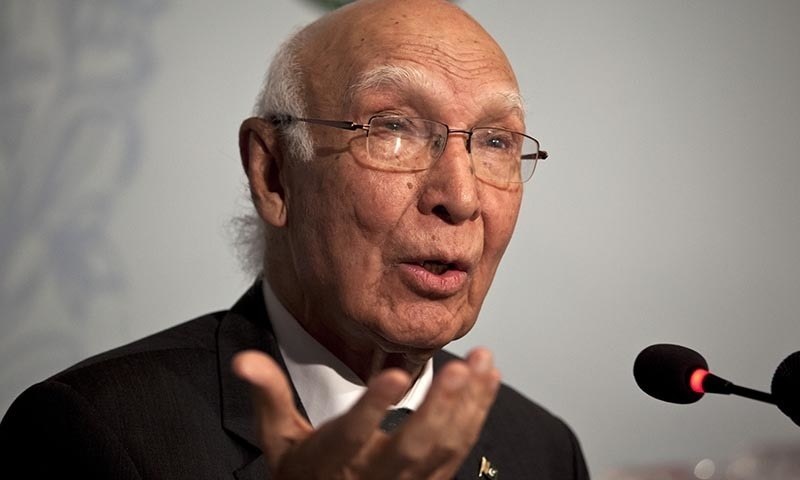ISLAMABAD: Adviser on Foreign Affairs Sartaj Aziz believes that it is not the right time for Pakistan to work for the revival of Afghan reconciliation process.
“Right now I don’t think the time is opportune,” Mr Aziz said on Monday while speaking to journalists at the Institute of Strategic Studies Islamabad (ISSI). He was replying to a question about prospects of the Afghan government agreeing to restart the process which got derailed after the disclosure of Mullah Omar’s death in July.
Pakistan, which facilitated and hosted the first round of peace process in Murree, has offered the Afghan government its help in resuming the process. But the Afghan government has not responded to the Pakistani suggestion.
Also read: Pakistan ready to facilitate Afghan-Taliban peace talks: Sartaj
Anti-Pakistan rhetoric in Afghanistan is at an all time high with Afghan Interior Minister Noorulhaq Uloomi telling the parliament in Kabul on Monday that “Pakistan continues to support terrorist groups (here) as in the past”.
In his press talk, Mr Aziz explained that for revival of peace talks both warring sides needed to be convinced about the usefulness of the process and should create the right atmosphere for it.
“Pre-conditions for a successful outcome are required, and that requires consensus on both sides. The Afghanistan government is one of the sides and the Taliban are the other, and they have to come to the situation which they think that useful discussions can take place,” he said.
Mr Aziz insisted that reconciliation was the surest way to peace in Afghanistan.
“Obviously, anything that will reduce the level of insurgency and infighting would be welcomed by Pakistan. Reconciliation is in our view, as the Washington statement also says, one of the best (options),” the adviser said.
Pakistan had last week called on Iran to help promote dialogue in Afghanistan.
“We would welcome any contribution which Iran can make also in talking to the groups, which are involved in this decision making and ultimately then promoting a more broad-based dialogue process to achieve peace and stability in Afghanistan,” Mr Aziz had said on Wednesday after his meeting with visiting Iranian Secretary of Supreme National Security Council Ali Shamkhani.
Earlier, speaking at a seminar on “Climate Change and International Security” at ISSI, Mr Aziz said Pakistan was fully committed to preventing any negative fallouts of climate change on the country. The Vision 2025 of the government, he said, clearly recognised global warming and climate change as problems.
He said that climate change posed a bigger threat to Pakistan than terrorism.
He hoped that the upcoming Paris Climate Conference (COP21) would lead to an agreement premised on the principles of United Nations framework convention.
Mr Aziz called for a collective international response to climate change.
Published in Dawn, November 3rd, 2015
On a mobile phone? Get the Dawn Mobile App: Apple Store | Google Play












































